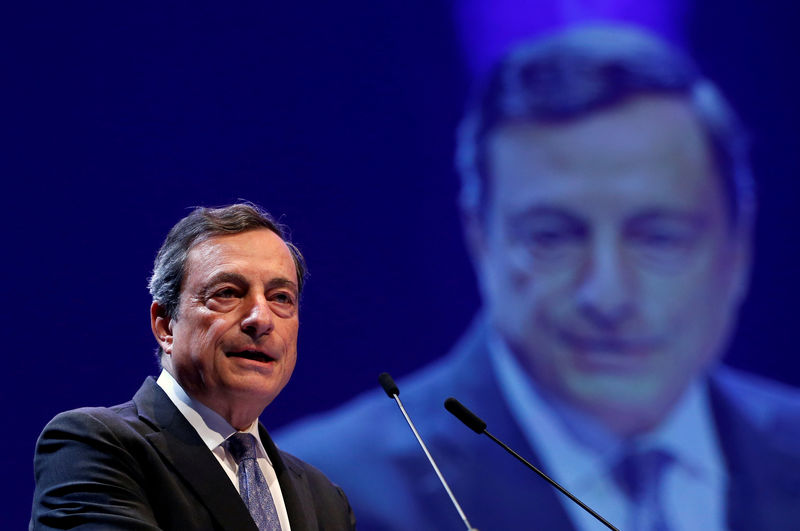NHL signs licensing deals with prediction-market startups Kalshi and Polymarket - WSJ
(Bloomberg) -- Mario Draghi is shouting louder than ever for help with the euro-area economy, and still no one is listening.
After stating that the outlook is getting “worse and worse,” the European Central Bank president said on Thursday it is “unquestionable” that governments will need to pitch in with fiscal measures if conditions keep deteriorating.
Draghi’s eight-year term, which ends in October, has been marked by negative interest rates, bond purchases and bank loans. While he’s promising that the ECB can add more stimulus, and looks poised to do so in September, the comments suggest that the central bank is getting close to the limits of its powers.
Yet Germany, which has a budget surplus and which can borrow money at sub-zero rates, doesn’t see the problem even as its own manufacturing sector contracts. Finance Minister Olaf Scholz told Bloomberg Television on Thursday, minutes before Draghi’s press conference, that he has no plans to loosen the country’s purse strings because it’s not “necessary or wise to act as if we were in a crisis.”
The ECB has been in crisis-fighting mode for years, combating the aftermath of the global financial meltdown, the euro zone’s own sovereign-debt struggles and a flirtation with deflation. It has unleashed innovative instruments including 2.6 trillion euros ($2.9 trillion) of quantitative easing and ultra-cheap bank loans that have flooded the region with liquidity, and promised to keep rates low for as long as needed to revive price growth.
For all the success the institution claims, such as six years of economic growth and more than 10 million new jobs, inflation remains far short of its goal. Professional forecasters cut their longer-term outlook for consumer-price growth to a record-low 1.7%, according to an ECB survey published Friday. That’s a risk to the central bank’s credibility, especially with trade tensions and Brexit threatening a new downturn.
“There is a sense that they are scraping the bottom of the barrel on monetary easing,” said Richard Barwell, an economist at BNP Paribas (PA:BNPP) Asset Management in London. “Hence fiscal policy will have to do more next time around.”
What Bloomberg’s Economists Say
“There are clearly many details that have yet to be fleshed out on what is likely to be a comprehensive and complementary package. Still, there appears to be broad agreement on its necessity.”--Maeva Cousin and Jamie Murray. See their ECB REACT
Draghi pointed out that he’s been asking governments to speed up plans to boost growth since at least 2014. The ECB has been calling on politicians to undertake structural reforms for decades.
Budget Surplus
To little avail. German Chancellor Angela Merkel’s administration ran a record budget surplus in 2018 of 1.7% of GDP, or 58 billion euros ($65 billion), and the debt burden is seen dropping to 51% of GDP in 2023. That’s well within European Union rules.
Governments have also been reluctant to make changes that would cause short-term pain in exchange for long-term gains, and citizens have often been unwilling to accept the nascent efforts that are made. France’s attempt to reform the labor market sparked riots last year.
Earlier this month, Group of Seven finance ministers meeting in France were only able to agree that fiscal policy should be “flexible and growth-friendly.” Even then, they said fiscal buffers should be rebuilt where needed.
“If there were to be a significant worsening in the euro-zone economy, it’s unquestionable that fiscal policy, a significant fiscal policy, becomes of the essence,” Draghi said.
Heavy Lifters
He’s not alone in his frustration. Federal Reserve Chairman Jay Powell has said it’s no good for monetary policy to be “the main game in town.” Christine Lagarde, who is leaving as head of the International Monetary Fund to succeed Draghi, has said that in the next slump the world will need “fiscal stimulus wherever possible.”
Part of the problem may be the extent to which the remit of central banks has grown. Since the 1990s, they’ve increasingly gained operational independence and been given inflation targets. While that’s designed to stop politicians from stoking growth with low interest rates before elections, it’s meant that central banks have done the heavy lifting to keep the economy expanding while governments try to reduce their debt loads.
JPMorgan Chase (NYSE:JPM) & Co. economists have also suggested other European governments are unlikely to do much either given the budget rules of the bloc. France, Italy and Spain must still tighten fiscal policy by around 2.5% of GDP to satisfy the guidelines, according to the New York bank’s calculations.
“The ECB is pretty close to running on empty,” said Everett Brown, European bond strategist at Ideaglobal in London. “Not so much that it can’t ease policy further with lower rates and quantitative easing, which it will do. But the scope is certainly diminishing.”
